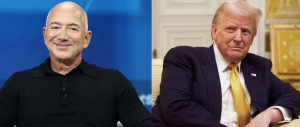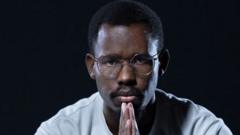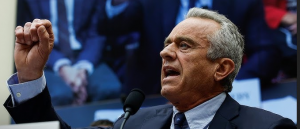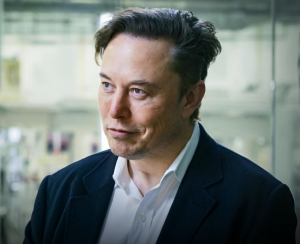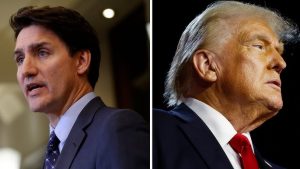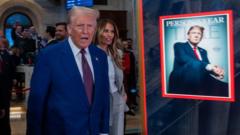Following significant investments in cryptocurrency firms by figures like Justin Sun, concerns are emerging about the ethical implications of Trump's deepening ties with the crypto industry as he prepares for a potential return to the White House.
Trump's Conflicts of Interest: The Intersection of Crypto Investment and Political Ambition

Trump's Conflicts of Interest: The Intersection of Crypto Investment and Political Ambition
An analysis of former President Donald Trump's business interests in the cryptocurrency sector and its potential impacts on governance.
In recent months, the intertwining of cryptocurrency investments and political maneuvers has raised eyebrows, particularly concerning former President Donald Trump and Chinese entrepreneur Justin Sun's latest ventures. Sun, known for an extravagant $6.2 million banana purchase as part of a publicity stunt, recently committed $30 million to World Liberty Financial, a struggling crypto firm positioned to capitalize on partnerships that include Trump. This investment has unlocked significant profit potential for Trump and his family, estimated at $20 million.
Ethics experts are sounding alarms over what this means for political integrity, suggesting that Trump's growing business empire might blur lines between governance and personal gain. Richard Painter, former chief ethics lawyer under George W. Bush, warns that the expansion of Trump's business interests heightens the risk of undue influence in U.S. policy-making. Trump's team, however, points out his reluctance to profit politically, asserting that the former president's primary motive is to serve the American people.
The Trump International Hotel previously became a focal point for similar concerns during his presidency, as critics alleged it provided a venue for lobbyists and foreign diplomats seeking favor. The current situation appears to be exacerbating conflicts of interest, as Trump's ventures in social media, cryptocurrency, and other enterprises proliferate.
For many observers, Trump's latest investments, particularly in the crypto market, present both ethical dilemmas and potential benefits to his personal wealth. There are apprehensions that the regulatory framework governing cryptocurrencies may be tailored to benefit Trump financially, should he return to office. This potential for self-serving policymaking in an industry Trump has pledged to champion could muddy the waters.
Trump's recent move to nominate Paul Atkins, known for his pro-crypto lobbying efforts, to lead the Securities and Exchange Commission raises further questions about the future landscape of regulatory enforcement. Analysts suggest that under Atkins's leadership, the SEC may become less vigilant in overseeing potential misconduct within the crypto industry, thereby complicating issues of accountability for firms like World Liberty Financial.
Despite Trump's historical resistance to external scrutiny during his time in the White House, the ethical standards surrounding the conduct of presidents remain relatively vague. Legal experts contend that the Supreme Court's previous rulings have created a challenging environment for addressing conflicts of interest. As Trump prepares for a re-election campaign, his strategies seem to disregard established norms, raising fears over the precedent this could establish for future administrations.
Critics argue that Trump's approach may encourage other leaders to disregard ethical constraints, paving the way for more relaxed attitudes toward possible corruption. As this scenario unfolds, the implications for both the crypto industry and U.S. governance warrant close observation and scrutiny from a diverse range of political and social viewpoints.
Ethics experts are sounding alarms over what this means for political integrity, suggesting that Trump's growing business empire might blur lines between governance and personal gain. Richard Painter, former chief ethics lawyer under George W. Bush, warns that the expansion of Trump's business interests heightens the risk of undue influence in U.S. policy-making. Trump's team, however, points out his reluctance to profit politically, asserting that the former president's primary motive is to serve the American people.
The Trump International Hotel previously became a focal point for similar concerns during his presidency, as critics alleged it provided a venue for lobbyists and foreign diplomats seeking favor. The current situation appears to be exacerbating conflicts of interest, as Trump's ventures in social media, cryptocurrency, and other enterprises proliferate.
For many observers, Trump's latest investments, particularly in the crypto market, present both ethical dilemmas and potential benefits to his personal wealth. There are apprehensions that the regulatory framework governing cryptocurrencies may be tailored to benefit Trump financially, should he return to office. This potential for self-serving policymaking in an industry Trump has pledged to champion could muddy the waters.
Trump's recent move to nominate Paul Atkins, known for his pro-crypto lobbying efforts, to lead the Securities and Exchange Commission raises further questions about the future landscape of regulatory enforcement. Analysts suggest that under Atkins's leadership, the SEC may become less vigilant in overseeing potential misconduct within the crypto industry, thereby complicating issues of accountability for firms like World Liberty Financial.
Despite Trump's historical resistance to external scrutiny during his time in the White House, the ethical standards surrounding the conduct of presidents remain relatively vague. Legal experts contend that the Supreme Court's previous rulings have created a challenging environment for addressing conflicts of interest. As Trump prepares for a re-election campaign, his strategies seem to disregard established norms, raising fears over the precedent this could establish for future administrations.
Critics argue that Trump's approach may encourage other leaders to disregard ethical constraints, paving the way for more relaxed attitudes toward possible corruption. As this scenario unfolds, the implications for both the crypto industry and U.S. governance warrant close observation and scrutiny from a diverse range of political and social viewpoints.


